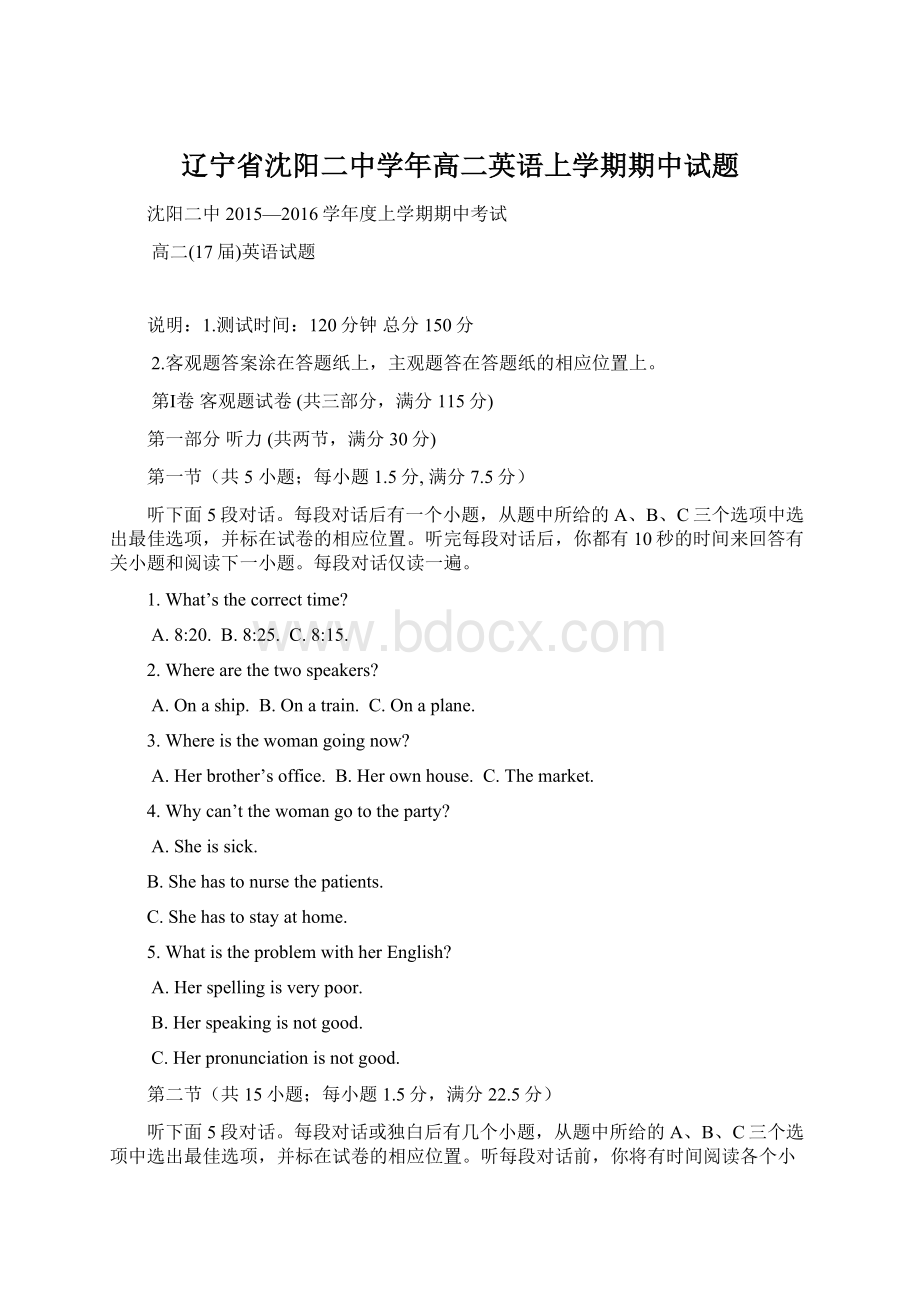辽宁省沈阳二中学年高二英语上学期期中试题.docx
《辽宁省沈阳二中学年高二英语上学期期中试题.docx》由会员分享,可在线阅读,更多相关《辽宁省沈阳二中学年高二英语上学期期中试题.docx(15页珍藏版)》请在冰豆网上搜索。

辽宁省沈阳二中学年高二英语上学期期中试题
沈阳二中2015—2016学年度上学期期中考试
高二(17届)英语试题
说明:
1.测试时间:
120分钟总分150分
2.客观题答案涂在答题纸上,主观题答在答题纸的相应位置上。
第Ⅰ卷客观题试卷(共三部分,满分115分)
第一部分听力(共两节,满分30分)
第一节(共5小题;每小题1.5分,满分7.5分)
听下面5段对话。
每段对话后有一个小题,从题中所给的A、B、C三个选项中选出最佳选项,并标在试卷的相应位置。
听完每段对话后,你都有10秒的时间来回答有关小题和阅读下一小题。
每段对话仅读一遍。
1.What’sthecorrecttime?
A.8:
20.B.8:
25.C.8:
15.
2.Wherearethetwospeakers?
A.Onaship.B.Onatrain.C.Onaplane.
3.Whereisthewomangoingnow?
A.Herbrother’soffice.B.Herownhouse.C.Themarket.
4.Whycan’tthewomangototheparty?
A.Sheissick.
B.Shehastonursethepatients.
C.Shehastostayathome.
5.WhatistheproblemwithherEnglish?
A.Herspellingisverypoor.
B.Herspeakingisnotgood.
C.Herpronunciationisnotgood.
第二节(共15小题;每小题1.5分,满分22.5分)
听下面5段对话。
每段对话或独白后有几个小题,从题中所给的A、B、C三个选项中选出最佳选项,并标在试卷的相应位置。
听每段对话前,你将有时间阅读各个小题,每小题5秒钟;听完后,各小题将给出5秒钟的作答时间。
每段对话或独白读两遍。
听第6段材料,回答第6-8题。
6.Wherearethetwospeakers?
A.Inthelibrary.B.Inadepartmentstore.C.Inthestreet.
7.Whoarethetwospeakers?
A.Awomanandhishusband.
B.Awomanandapasser-by.
C.Awomanandherfriend.
8.Wherewillthewomanchangebuses?
A.Atthezoo.
B.Atthetrafficlights.
C.AttheendoftheNo.9bus.
听第7段材料,回答第9-11题。
9.WhyisthemangoingtotheStates?
A.Visitplacesofinterest.B.Visithisfriends.C.Attendaconference.
10.Howlongwilltheconferencelast?
A.Onemonth.B.Twoweeks.C.Sevendays.
11.Whatistheman?
A.Ascientist.B.Awriter.C.Atraveler.
听第8段材料,回答第12-14题。
12.Wheredoesthisconversationtakeplace?
A.Atschool.B.Inthestreet.C.Onthephone.
13.Whyisthewomangoingtoborrowsomeoldexampapers?
A.Shewantstolookthroughthem.
B.Hersaremissing.
C.Shewantstocheckthem.
14.Whenwillthetwomeeteachother?
A.Atbreakfasttime.B.Atlunchtime.C.Atsuppertime.
听第9段材料,回答第15-17题。
15.Wheredoestheconversationprobablytakeplace?
A.Inalibrary.B.Inaclassroom.C.Inabookstore.
16.Whatisthemandoing?
A.Returningsomebooks.
B.Lookingforabook.
C.Writingaresearchpaper.
17.Whatdoesthewomantellthemantodo?
A.Toreturntheduebooks.
B.Torefertothecardlist.
C.Tomakeuseofthecomputer.
听第10段材料,回答第18-20题。
18.Whodoesthespeakertalkto?
A.Afriendofhis.B.Agroupofnewstudents.C.Agroupofvisitors.
19.Whatisthetotalnumberofdepartmentsinthecollege?
A.Six.B.Five.C.Four.
20.WheredotheteachersintheEnglishdepartmentmainlycomefrom?
A.EnglandandAmerica.
B.AmericaandAustralia.
C.AmericaandCanada.
第二部分阅读理解(共两节,满分40分)
第一节(共15小题;每小题2分,满分30分)
阅读下列短文,从每题所给的四个选项(A、B、C、D)中,选出最佳选项,并在答题卡上将该项涂黑。
A
Itwasawintermorning,justacoupleofweeksbeforeChristmas2005.Whilemostpeoplewerewarminguptheircars,Trevor,myhusband,hadtogetupearlytoridehisbikefourkilometersawayfromhometowork.Onarrival,heparkedhisbikeoutsidethebackdoorasheusuallydoes.Afterputtingin10hoursoflabor,hereturnedtofindhisbikegone.
Thebike,ablackKona18speed,wasouronlytransport.Trevorusedittogettowork,puttingin60-hourweekstosupporthisyoungfamily.Andthebikewasalsousedtogetgroceries(食品杂货),savingusfromhavingtowalklongdistancesfromwherewelive.
IwassosadthatsomeonewouldstealourbikethatIwrotetothenewspaperandtoldthemourstory.Shortlyafterthat,severalpeopleinourareaofferedtohelp.Onewonderfulstrangerevenboughtabike,andthencalledmyhusbandtopickitup.Onceagainmyhusbandhadawaytogettoandfromhisjob.Itreallyisanhonorthatacompletestrangerwouldgooutoftheirwayforsomeonetheyhavenevermetbefore.
Peoplesaythatasmilecanbepassedfromonepersontoanother,butactsofkindnessfromstrangersareevenmoreso.Thisexperiencehashadaspreadingeffectinourlivesbecauseitstrengthenedourfaithinhumanityasawhole.Andithasinfluencedustobemoremindfulofwayswe,too,cansharewithothers.Nomatterhowbigorhowsmall,anactofkindnessshowsthatsomeonecares.Andtheresultscanbeeverlasting.
21.Whywasthebikesoimportanttothecouple?
A.Theman’sjobwasbikeracing.
B.Itwastheironlypossession.
C.ItwasaniceKona18speed.
D.Theyuseditforworkanddailylife.
22.Wecaninferfromthetextthat________.
A.thecoupleworked60hoursaweek
B.peoplewerebusybeforeChristmas
C.thestrangerbroughtoverthebike
D.lifewashardfortheyoungfamily
23.Howdidpeoplegettoknowthecouple’sproblem?
A.Fromradiobroadcasts.B.Fromanewspaper.
C.FromTVnews.D.Fromastranger.
24.Whatdothecouplelearnfromtheirexperience?
A.Strangersareusuallyoflittlehelp.
B.Oneshouldtakecareoftheirbike.
C.Newsreportsmakepeoplefamous.
D.Anactofkindnesscanmeanalot.
B
AnewwordhassuddenlybecomewildlypopularinChina—“tuhao”—whichlooselymeans“nouveauriche”.Therehavebeenmorethan100millionreferencestotheword“tuhao”onsocialmediasinceearlySeptember.
It’sbeingusedtodescribeeverythingfromthenewpeople’sdailybuilding,toexpensivecelebrityweddingsfullofmillionaires,andthenewgold-colorediPhone.
InChinese“tu”meansearthand“hao”meansrich.Tosaysomeoneistuhaoistoimplytheycomefromapoorpeasantbackground,andhavemadeitrichquickly—butdon’tquitehavethemannerstogoalongwithit.“It’sliketheterm‘nouveauriche’”,saysProfessorSteveTsangattheSchoolofContemporaryChineseStudiesinNottingham,“buthasevenmorenegativemeanings,suggestingacertainvulgarity(粗俗).”
“Tuhao”isactuallyanoldword,datingbackperhapsasfarastheSouthernDynasty—1,500yearsago,butithasalwaysmeantsomethingratherdifferent.Duringthecommunistrevolution,fromthe1920stoearly1950s,itwaswidelyusedtorefertolandholdersandgentry(乡绅)whowouldoftendobadthingstothosebeneaththem.
ThisnewusageofthetermtookoffinSeptemberafterawidely-sharedjokeaboutarich,butunhappyman,whogoestoaBuddhistmonkforadvice,expectingtobetoldtoliveamoresimplelife.Themonkrepliesinsteadwithasentence,“Tuhao,let’sbefriends!
”
ChineseInternetusersarehighlycreativeintheiruseoflanguage,andareconstantlyinventing,andre-inventingwordsasawayofgettingpastcensorship(审查)rules.Butinthiscase,itspopularityseemstobedowntothefactthatitexpressesChina’schangingsocietysowell—manypeoplesneeratthosewithwealth,butaresecretlyjealous.
25.Whatisthebesttitleofthepassage?
A.Tuhao,anewlypopularwordinChina
B.ThelonghistoryofTuhao
C.ThenewusageofTuhao
D.Tuhao,anewly-inventedChineseword
26.WhichofthefollowingmayNOTbeconsidered“tuhao”?
A.Avulgarnouveauriche.
B.Alandholder.
C.Aquick-richpeasantwithoutpropermanners.
D.ABuddhistmonk.
27.Thelastbutoneparagraphmainlytellsus________.
A.whatthenewusageofthewordis
B.howthewordbecomespopularagain
C.whytheunhappymanwenttotheBuddhistmonk
D.whatadvicethemonkgavetheunhappyman
28.Whatdoestheunderlinedwordinthelastparagraphmean?
A.Respect.B.Envy.C.Laugh.D.Disbelieve.
C
Noonecanfailtostandinawed(令人敬畏的)admirationofthegreatdiscoveriesofhistory—Newton’slawsofmotion,Kepler’sprincipleofplanetarymovement,Einstein’sgeneraltheoryofrelativity.Equallyawe-inspiringareartisticcreationsinpainting,theatre,music,andliterature,whichhavealsobeenbroughtaboutbydiscoverythroughpersonalefforts.Whatdotheseextraordinaryachievementsofwell-knownscientistsandartistshavetodowithproblemsolving?
Agreatscientificdiscoveryoragreatworkofartissurelytheresultofproblem-solvingactivity.Thesolutiontoaproblem,wearetold,oftencomestothinkersina“flashofinsight(顿悟)”,althoughtheymayhavebeenturningtheproblemoverintheirmindsforsometime.Asaparticularformofproblemsolving,thesecreativeactsarebasedonthebroadknowledgegainedinthepast,whetherthisisofthe“public”sortknowntoscience,orofthe“private”sortknowntotheartist.
Manycreativethinkersstatethattheyhavecompletelydevotedthemselvestothesubjectmatteroftheproblem,oftenoverfairlylongperiodsoftime.Indeed,itwouldbestrangeiftheyhadnotdonethis.Nothinginsuchstatementssupportstheideathatthereisanythingverydifferentabouttheproblemsolvingthatleadstodiscoveriesofthegreatcontributionstothesociety.Theactofdiscovery,evenintherelativelypredictablesensethatitoccursineverydaylearning,involvesa“suddeninsight”whichchangestheproblemsituationintoasolutionsituation.Aswehaveseen,everydaydiscoveryalsorequiresthatthelearnerhavetheknowledgeoftherulesgainedinthepast,whichisinvolvedinthesolution.
29.Newton,KeplerandEinsteinarementionedinthefirstparagraphto________.
A.bringaboutthesubjectofthediscussion
B.explainthatscientistsaremorecreative
C.showthedifferencebetweenscienceandarts
D.provethatartsrequiremorepersonalefforts
30.Whileknowledgefromthepastplaysanimportantroleintheirachievements,thinkers
sometimesalsodependontheir________.
A.artistictastesB.suddeninsight
C.admirationofdiscoveriesD.scientificexperiments
31.Whatdoestheunderlinedword“this”referto?
A.Greatcontributionstothesociety.
B.Long-timestudyofthesubjectmatter.
C.Variousstatementsaboutproblemsolving.
D.Completedevotiontoa